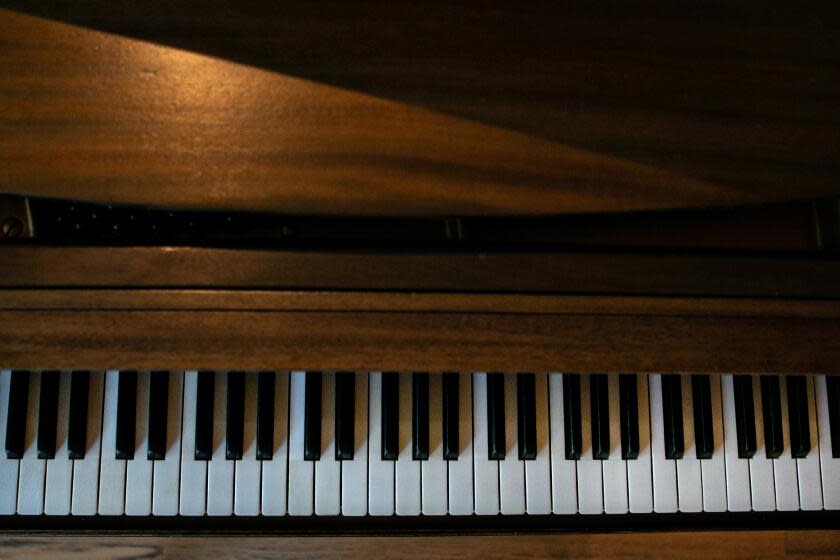Opinion: When my son stopped piano, I took over his lessons. Here's how that went

In the early 1980s, my father got a Baldwin upright electric piano. My dad had played piano as a child and in college. He’d performed live, improvising soundtracks to silent movies at an art-house cinema in Connecticut.
I wanted to learn how to play because I wanted to be like him. My father put stickers on the keys and hand wrote the notes’ letters on each one. He taught me “Yesterday” by the Beatles and “Heart and Soul,” which delighted me, especially when he’d riff on the right-hand melody — a flash of that virtuoso improvisation he’d perfected at the movie theater.
Read more: Opinion: The musical gift Los Angeles offers public school kids
I also watched my best friend, Sarah, learning “Für Elise,” and figured out how to play it myself. But that was the extent of my repertoire, and my father didn’t teach me anything else. When I was 12, he moved to a smaller apartment and gave away the electric piano.
I didn’t think about playing the piano again for more than two decades. When I had children, I anticipated they would take lessons. When friends were getting rid of their baby grand, I sent movers to bring it to our house.
Read more: Opinion: Where have all the pianos gone? No one has time for them anymore
At 8, my daughter was the right age to start learning just as COVID hit. She took up voice lessons over Zoom instead. Last spring, it was my son’s turn. I signed him up for a weekly piano class at a music school in northeast L.A. where we live. He seemed to enjoy it, though his teacher mentioned he preferred drums. They began spending half the lesson on percussion.
Then last June, the music school sent out an email offering a weeklong songwriting camp. My heart started pounding. I was terrified, but I knew instantly I was going to sign up. I’ll learn, I thought. I emailed back to ask if the camp was open to adults. It was, and I was in.
Read more: Opinion: It might be Taylor Swift's year at the Grammys, but it's not the 'year of the woman'
The first day, I woke up feeling like a fool. I was nearly 45. I didn’t play an instrument. I imagined walking into a room of children who could read music. Would they write songs about YouTubers, while I wrote songs about death?
The school was inside a small, converted house that looked frozen in ’90s suburbia — gray carpet, wood-paneled walls, Christmas lights up in the summer and music gear everywhere. Mouth dry, I prepared for the awkward introductions to my prepubescent classmates. A wiry man about my age in black skinny jeans and Converse high-tops was sitting by the window in the tiny waiting area. This was Danny, and he was the only other student.
Read more: Op-Ed: An ode to Philly soul: La-la means more than 'I love you'
The next five days were like the dizzying descent into love. We learned about keys, chords, rhythm, harmony. Then we went into the studio and laid down tracks in GarageBand, the music software. To me, it was the revelation of a secret language, by which our thoughts and feelings could be mainlined to another person’s soul through the precise arrangement of sounds.
We made a rhythm, then a chord progression, then a baseline, then a melody. There were steps, we learned. There was a method. And there was mystery, too. One choice leads to another, then alchemy takes hold — a composition emerges from some other, unknowable place.
The third night I went home and wrote lyrics. I thought of my first love, of sitting in his adolescent bedroom in Brooklyn, the snow outside. I wrote about how years later I would try to act like it didn’t mean as much as it did.
By the end of the week, we’d made a song. It wasn’t finished, and maybe it wasn’t very good, but it felt amazing. By autumn, I’d forgotten much of what I’d learned. I’d listen to Taylor Swift, trying to discern why her songs were so compelling. I’d sit at my hand-me-down piano wishing I could play like my father, wishing the music would course through me like a wave, then spill onto the keys.
It became clear that my son didn’t have time for piano, but I had paid for the next month of his lessons. So I took them, partly to connect with my dad, mostly to connect with that mysterious place from which creativity comes. That month became two, then three and I’m still showing up.
The humility required to continue is sometimes unbearable. Each week, I imagine it will be the last, that I will tell the teacher I don’t have time, it’s too expensive. And then I sit down and learn the next part of a song. I discover just a little bit more about how music works, and I recommit.
Mastering a skill is satisfying, but surrendering to a beginner’s mind-set can be life-changing. There is power in doing things that daunt us, that make us feel small at first, then allow us to grow. Still, it requires a steady reminder that it’s hard, becoming ourselves. Maybe I will write a song about that.
Emily Ziff Griffin is a Los Angeles-based screenwriter, producer, author and essayist.
This story originally appeared in Los Angeles Times.

